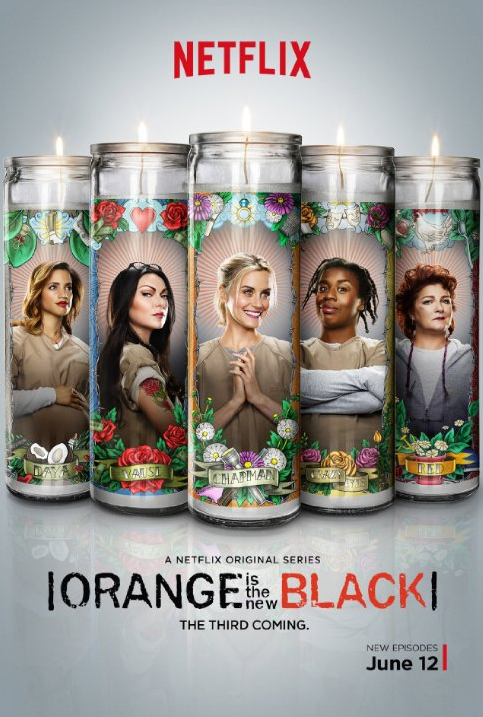orange is the new black: why are we itching for the third season?
Full of sex, criminality and queer-dom, it’s little wonder why Orange is the New Black (OITNB) has amassed a devoted following. The show launched in July 2013, and quickly shot to the leader board for Netflix’s most popular shows. Responding to pleas, producers will release the third season late this June. Inane at times, the real appeal of OITNB goes beyond its use of taboo. The show meets the cultural norms of a typically unsatisfied demographic, by representing queer women, and themes of authenticity and understanding.
Based on a true story, OITNB follows the journey of ‘nice, white girl’ turned bad-ass criminal, Piper Chapman. Happily ensconced with fiancé Larry (Jason Biggs), Piper’s life takes a sudden turn for the worse moments before she closes her hand on the American dream. She is arrested for a drug smuggling crime she committed years ago for then-girlfriend, Alex (Laura Prepon). Crying in Larry’s arms as she leaves him for a year in prison, she is comforted that little will change between them.
But here we all are two season’s later: Piper’s f*cked her ex-girlfriend in a prison chapel, taken a shit while “staring someone in the eyes” and punched the teeth out of a religious fundamentalist. Joining her fellow inmates in a struggle to survive the poor conditions and social jungle of Litchfield prison, its understandable why Piper and Larry feel that everything’s changed.
Humour is peppered throughout this drama. From a chase for mystical chickens to witty banter, its comedic relief reminds us that amongst all the conflict, “there’s always hope tomorrow will be taco night”. Though funny and entertaining at times, the humour isn’t uproarious enough to distinguish OITNB from other comedy dramas. Depending on your bent, you could probably get more lols from a drunken binge on Jenna Marbles.
The greater contributing factor to OITNB’s success is its ability to reflect cultural trends popular among its demographic: left-leaning, queer women. In the first instance, the show represents same-sex attraction and non-cis identities as normal and respectable, refreshing beside the heteronormativity of most television. Many characters identify as queer and represent a spectrum of same-sex attraction. While Nicky (Natasha Lyone) and ‘Big Boo’ (Lea DeLaria) are proudly lesbian, at one point competing to have sex with the most women in prison; Morello (Yael Stone) and Piper show how sexuality can be more fluid, with varying interests in men and women throughout the show.
OITNB also gives a more realistic portrayal of lesbian sex. Most mainstream film and television stylises lesbian affection or sex on the basis of male expectations. By contrast, OITNB is honest; female characters have autonomy and chemistry; sex can be interrupted or unattractive (on-a-toilet-wearing-sandals-and-socks unattractive), and is performed for the women involved, not men. If for nothing else, the representation of queer identities and sexualities in mainstream television makes OITNB worthwhile for viewers.
OITNB also reflects the key values of understanding and authenticity popular among its demographic. Every episode features the backstory of an inmate, describing the contextual and psychological factors which led them to commit crime. Some, like Gloria (Selenis Leyva) suffered domestic violence, whereas others were motivated by poor influences or financial need. This veers away from the popular representations of criminals as intrinsically evil. Instead, the show encourages understanding by humanising inmates as equal members of society who were simply dealt a worse hand. Prison guard, Fischer (Lauren Lapkus) brings this message clarity when she tells Piper, “you and me are the same.”
OITNB falls into the same trap it challenges, however. Backstory scenes are generally rushed and limited to one episode per character. Afterwards, many are depicted as one dimensional. Poussey is only interested in “making mad jokes”, and Big Boo in sex. Its a characterisation-pit which OITNB struggles to pull itself out of, particularly in its stereotyping of black and latino women. Challenging racial tension and segregation is an important element of OITNB’s plot, but this falls flat considering the characterisations of “Taystee” (Danielle Brookes) and Poussey (Samira Wiley). The banter between these two devolves from a sign of friendship, into a caricature of black people as jokers. This is exemplified by Taystee’s alcoholic’s anonymous speech, which starts off: “I’m sitting there with BBQ sauce all over my titties and I’m all like, what the fuck, again?!”. Latino women are similarly relegated to the role of dramatic and over-preened gossips. Although OITNB promotes understanding and respect for human complexity, it drops the ball here in lieu of entertainment.
Despite its faults, OITNB fills a demand. Bringing queer identities and sexualities into mainstream media, and challenging our judgment of others, the show has largely been welcomed by the queer community. That these values can be shared among other demographics is both validating and a positive sign that our society is moving in the right direction. If you’re looking for an intellectually demanding watch, you’re better off elsewhere. But its success shows that, for those who are up for a laugh and a unique perspective, OITNB fits the bill.



This is the best and most insightful film/television review I’ve ever read. Great work, Caitlin.
Pingback: Feminist Friendly: On Diversity on Television | Lip Magazine